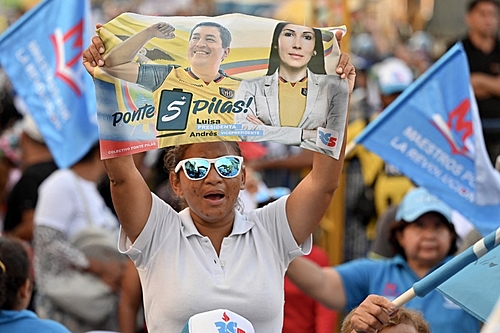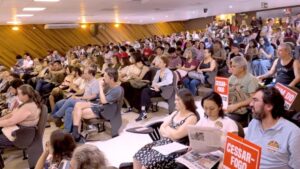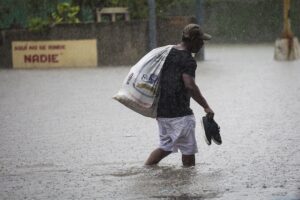
Ecuadorians go to the polls this Sunday (20) to elect who will preside over the country until 2025. It will be a short term, because the election was brought forward by the current president, Guillermo Lasso.
The decision, enacted through the legal mechanism called ‘crossed death’, which shortened Lasso’s mandate and dissolved the National Assembly, reveals political instability, which, however, is just one of several facets of the serious crisis that the country is going through. country. The others are impoverishment of the population, corruption and organized crime violence, fueled by drug trafficking.
During the campaign, violence rose to unprecedented levels: the mayor of a large city, a (right-wing) presidential candidate, and a historic leader of the left-wing Revolución Ciudadana party, which until then had led in the polls, were shot dead. Not to mention that a candidate for deputy from the same party survived an armed attack.
The murdered candidate was Fernando Villavicencio, an investigative journalist who became a candidate by fighting corruption. He was killed in public, in broad daylight, just days before the last campaign debate. This is the climate of insecurity and instability that surrounds the election.
In addition to rampant violence, Ecuadorians face serious socioeconomic difficulties. According to data from 2022, 56% of the population works in precarious informal jobs, unemployment is close to 20% and poverty affects 25% of citizens.
To deal with this scenario, the leftist candidacy, led by Luisa González, proposes to build a sustainable, inclusive and egalitarian economic system that provides economic justice and equal opportunities. She points to the neoliberal agenda of post-Rafael Correa (2007-2017) rulers as the culprit, but after the most recent debate, she was criticized for looking more to the past than the future.
The right, on the other hand, proposes more liberal ideas, in which the State has a less prominent role. The proposal, particularly on the side of the far-right opponent Jan Topic, is the formula of neoliberalism: austerity, deregulation of the economy, encouraging investment and betting on the ability of the private sector to generate jobs.
Second round likely
Voting intention polls are unreliable in Ecuador. Even so, unofficial surveys indicate that candidates Luisa González/Andrés Arauz (Revolución Ciudadana) and Jan Topic/Diana Jácome (Por un País sin Miedo), lead the electorate’s preference and, in theory, are the most likely to run the second round.
But in such a tumultuous electoral process, it cannot be ruled out that other candidacies will come as a surprise, especially those from the coalitions Claro que se Puede (Yaku Pérez and Nory Pinela), Movimiento Actuemos (Otto Sonnenholzner and Erika Paredes), Movimiento Construye (Fernando Villavicencio and Andrea González ) — Villavicencio’s name will be on the ballots, as they had already been printed when he was assassinated.
Sonnenholzner would be, among those last three, the one with the best chance of facing González in the second round, if he manages to overcome Topic. All slates are formed by a woman and a man, in compliance with the law that establishes gender parity.
Villavicencio’s death may have harmed González, especially given the accusations made without evidence that Rafael Correa, guarantor of González’s candidacy, was involved in the murder, a hypothesis that gains echo in a country where the ruling class and the big press harbor antipathy for him and his popular political project. On the other hand, the idea that Topic could be involved with the crime has also gained some evidence in recent days, due to the fact that Villavicencio has denounced irregularities in contracts maintained by companies of that candidate with the public power.
Click here to learn more about the context surrounding this election.
On the coke route
Ecuador is currently one of the poorest countries in Latin America and food and social insecurity and low levels of education have contributed to the increase in crime. In addition, state corruption, another crisis that has been faced for years, also encourages organized and institutionalized crime. However, in recent years, drug trafficking has emerged as the most significant reason for the public security crisis in the Andean territory.
Read more here and understand how the coca route moved to Ecuador.
“We are facing a new phenomenon, with national and international roots: the presence of organized crime and criminal mafias,” said historian Juan Paz y Miño Cepeda in an interview with the independent media collective The communication. According to him, the shrinkage of the State dismantled the security capabilities of the public power and also weakened the investments that would have allowed the reinforcement of police forces and social policies. Nowadays, says Cepeda, there is an “informal” or “illegal” force of power that is overlapping formal power, which leads the population to live in fear and impotence.
Referendums
In addition to the president and vice president, Ecuadorians will elect the 137 members of the National Assembly, in addition to voting in two popular consultations on ecological issues: a national one, on whether or not to explore oil in the Yasuní National Park, in the Amazon; and another local (Quito), on whether or not to prohibit mining in the Andean Chocó biome.
Ecuador is a small country, which does not have many natural resources that can be transformed into income for social investments. Therefore, oil and minerals represent potential sources to help deal with social and economic problems. At the same time, the appeal of environmental preservation is significant, particularly among younger voters. It is a thorny issue, for example, for the González/Arauz ticket, which defends sovereign oil exploration in Yasuní to increase public investment in health and education.
Editing: Rodrigo Durão Coelho
Source: www.brasildefato.com.br

